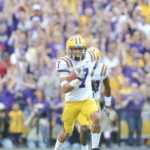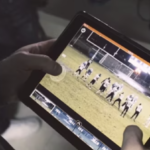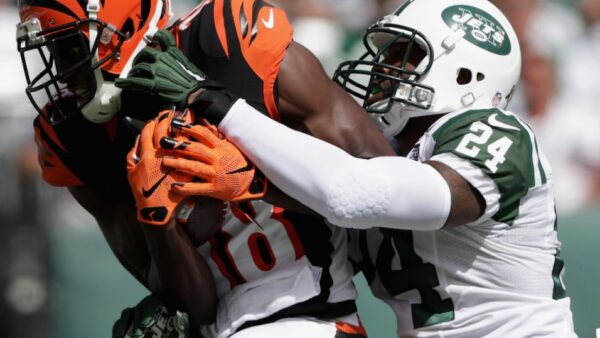The Importance of Film Study for a Playmaking DB
By: Chad Wilson
Owner – All Eyes DB Camp
If there is one downfall for young defensive backs in the game of football it is their unwillingness or inability to study film. Time and again, I have come across defensive backs who don’t have the drive or ability to study their opponent or themselves. Unfortunately, if you are going to reach your peak as a player then it’s an action you are going to have to engage in quite often. I am also here to tell you that it’s better if you love it.
Understanding the Importance
Film study serves as a virtual playbook for defensive backs, offering a window into the minds of opposing offenses. By dissecting game footage, DBs can identify tendencies, recognize patterns, and anticipate plays before they happen. This proactive approach allows guys in the secondary to position themselves effectively, rack up PBUs, and make game-changing plays. The action on the field happens too fast to be 100% reactive. Like most problems in life, you are better able to handle them if you can see them coming before they actually arrive. The offense trying to move down the field and into your end zone, especially via the air, is a problem. Studying film allows you to see the problems before they become problems. Coaches love guys who handle problems and ultimately, the best paid players at this position are the ones who consistently handle the pesky quarterback to receiver problems.
Analyzing Opponents
One of the primary objectives of film study is to analyze opponents’ tendencies and formations. DBs can identify recurring patterns in play calling, like preferred routes on certain downs or tendencies in specific field positions. By recognizing these patterns, DBs can adjust their positioning and coverage strategies accordingly to gain a competitive edge over their opponents.
Offenses are creatures of habits. It’s just human nature to repeat things that have been successful for you. This is especially true when the situations get most intense like on 3rd down. Analyzing your opponent can give you insight into what stresses them and what works for them when they are in the high stress situations. Some teams love certain plays while others love certain players. How many times have seen a quarterback getting pressure, just throw the ball up to their favorite receiver. Just think Mahomes to MaAuto and you’ll know what I am talking about. Wouldn’t it be nice to know where the QB is going when the blitz is coming?
Recognizing Route Concepts
Film study enables DBs to recognize and anticipate route concepts commonly used by opposing offenses. By studying receivers’ alignments, splits, and pre-snap movements, defenders can anticipate potential routes and adjust their coverage accordingly. Additionally, analyzing quarterbacks’ tendencies and throwing mechanics can provide valuable insights into potential passing targets and route combinations.
There are a lot of things that are constant in offensive football. Sure, teams try to disguise and window dress but if you study enough you realize that most of the times things end up being the same. There’s a limit to many of the things you can do on the field. An offense won’t have much success running hitch by the outside receiver and a quick out by the inside receiver. Certain routes work well together like peanut butter and jelly. Study film to get a solid idea of what combos teams run and take note of the little things a team does that is unique to their style of play.
Learning From Mistakes
Film study isn’t just about dissecting opponents’ strategies—it’s also about self-improvement. By reviewing your own game and practice film, you can identify areas for improvement, analyze your decision-making processes, and learn from past mistakes. This reflective approach allows you to refine your techniques, correct errors, and dramatically improve as a playmaker.
This is one area where a lot of guys will need improvement. Be honest with yourself, how much do you watch your practice film? I am not just talking about 1-on-1s. Do you watch 7on7? Do you watch team? How about indy period? A lot of DBs hate indy period but the truth is that it’s indy where you develop your playmaking skills. Spend some time watching how you do your drills. Make daily improvements and watch how you start finding yourself in better position to make plays more often.
Practical Tips for Effective Film Study
1. Establish a Routine: Set aside dedicated time each day / week for film study to incorporate it into your regular training regimen.
2. Focus on Key Players: Pay close attention to opposing quarterbacks, top receivers, and offensive playmakers when analyzing game footage.
3. Take Notes: Keep a notebook or digital document to jot down observations, tendencies, and strategic insights gleaned from film study sessions.
4. Collaborate with Coaches: Work closely with your coaches to identify key points of emphasis and develop a game plan based on your film study findings.
5. Repeat: Watch an opponent’s film more than once. Don’t just watch one or two games and think you’re ready. It’s ok to watch the same game several times. I can assure that each time you watch a film you see something new and pick up more clues. That’s just natural. I can’t tell you how many times I picked up a major key to an offense on the 3rd or 4th time watching the same game. Finding the key to a play, a player or an entire offense before you play them is a big thrill. Take my word for it.
Lifting weights, running sprints and performing drill work is essential in your journey to become a great defensive back. Equally or even more important than those things are having an understanding of how you will be attacked when you are playing the game. A great general does not go into battle without studying his plans and the movements of the opposing army. That is a recipe for death. If you want the interceptions, pass break ups, caused fumbles and all the other goodies that defensive backs yearn for, you’ll have to love to study. Anticipation is the mother of success. You have to see it before you be it. Watching film puts you in the game and on the field before the kickoff. How good are you at something when you have done it already? Film study allows you to do that. Learn to love it. That’s how you ‘Play Defense’
Chad Wilson is the owner of All Eyes DB Camp and author of "101 DB Tips". He played college football at the University of Miami and briefly in the NFL for the Seattle Seahawks. Over his 15 year high school football coaching career, he tutored over a dozen Division I defensive backs and as a trainer has worked with NFL All Pros, first round draft picks, college football All Americans and Top 10 ranked high school football prospects.









